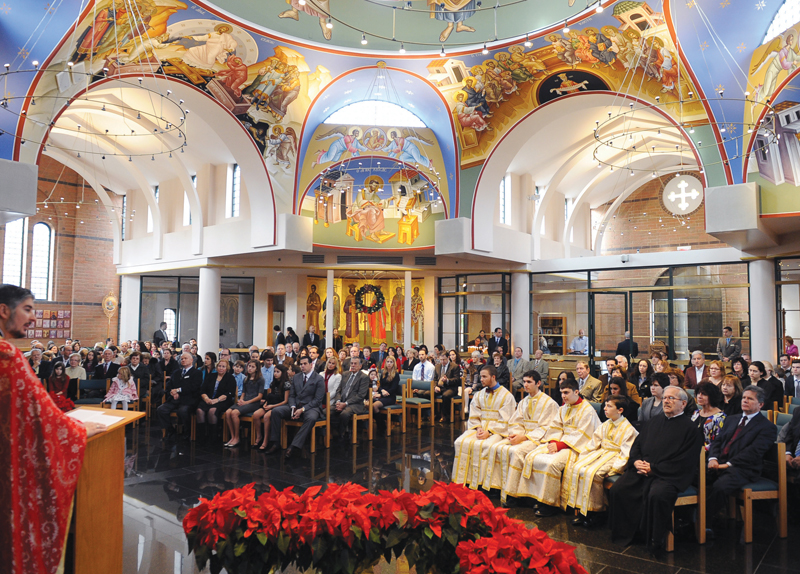GREEK NAME DAY CUSTOMS AND PRACTICES
Do you know where your name came from? If you are Korean, your name may have been chosen by one of your grandparents. However, if you are Greek, your name probably comes from a Greek Orthodox saint. In Greece, names are so important that everyone celebrates the “Name Day” of the saint that shares the same name. Specific days are assigned to specific saints, so each saint has a “feast day.” This day is often considered more important than a birthday, especially as people approach adulthood.
Greek names reflect the rich history of the country. Because the naming rules have been strict for such a long time, the same names have been used repeatedly for hundreds of years, or more longer, in a single family. In many cases, these names were selected due to local association with the saint. For instance, Pavlos is a common name on the south coast of Crete, where St. Paul was shipwrecked about two thousand years ago. However, Pavlos is not as common throughout the rest of Greece. Some Greeks are named after Olympian gods or goddesses, like Apollo or Hera.
Many Greek naming customs are still followed today. Greek children are often named after their grandparents. For example, if a couple has three children, each of whom has a son, all three of these cousins will have the same name. Additionally, the three cousins will celebrate the same saint’s Name Day!
Name Days are observed each year with gifts and parties. Greeks celebrate the actual saints that share their name on the saint’s day. It is a cause for a party so big that it oftentimes overshadows birthday celebrations. In the past times, Name Day celebrations would be hosted open-house style, meaning that they were open to anyone passing by, but most parties today are by invitation only. Similar to birthday celebrations in other cultures, Name Day parties take place at homes, clubs, restaurants, or bars. Guests are expected to bring gifts and well wishes. If you have a friend who is observing his or her name day, you should wish them “Χρ?νια Πολλ? (Hronia Polla),” which means “many happy years.”

VOCABULARY:
Greek Orthodox 그리스 정교회
saint 성인, 성자
assign 지정하다
adulthood 성인, 성년
reflect (사물의 속성 등을) 나타내다, 반영하다
association 협회
shipwreck 조난을 당하다
throughout 도처에
observe (축제, 생일 등을) 축하하다
oftentimes 종종
overshadow 무색하게 만들다, 신이 나지 않게 만들다
KOREAN TRANSLATION:
그리스 영명 축일의 관습
여러분은 당신이 이름이 어디로부터 왔는지 아는가?
만약 당신이 한국인이라면, 당신의 이름은 조부모 중 한 명에 의해 선택되었을지도 모른다.
그러나, 만약 당신이 그리스인이라면, 당신의 이름은 아마도 그리스 정교회로부터 왔을지도 모른다.
그리스에서, 이름은 매우 중요하여 모두가 같은 이름을 공유하는 성인의 “영명 축일”을 기념한다.
특정한 날은 특정한 성인들로 지정이 되어, 각각의 성인은 “축일”을 갖고 있다.
특히 사람들이 성년에 가까워지면서, 이 날은 생일보다 더 중요하게 여겨진다.
그리스의 이름은 국가의 풍부한 역사를 반영한다.
이름을 짓는 규칙이 오랜 시간 동안 엄격해왔기 때문에, 같은 이름들은 수백 년 동안, 혹은 더 오래, 한 가문에서 반복하여 사용되었다.
많은 경우에서, 이러한 이름들은 성인과 함께 하는 지역 협회로 인해 선택된다.
예를 들어, Pavlos는 St. Paul이 약 2천년 전에 조난을 당한 크레타 섬의 남쪽 해안에서 흔한 이름이다.
그러나, Pavlos는 그리스의 나머지 지역에서는 남쪽 해안만큼 흔하지 않다.
어떤 그리스인들은 아폴로와 헤라와 같은 올림포스 산의 신이나 여신의 이름을 따서 짓는다.
많은 그리스 명명 관습은 오늘날에도 여전히 지켜지고 있다.
그리스 아이들은 흔히 그들의 조부모의 이름을 따서 짓는다.
예를 들어, 만약 한 부부가 세 명의 아이들이 있고, 각각의 아이들이 아들을 갖는다면, 이 사촌들 셋 모두는 같은 이름을 갖게 될 것이다.
게다가, 세 사촌들은 같은 성인의 축일을 기념할 것이다!
축일은 매년 선물과 파티와 함께 축하한다.
그리스인들은 성인의 날에 그들의 이름을 공유하는 실제 성인들을 기념한다.
파티는 정말 커서 그것은 종종 생일 축하를 무색하게 만드는 원인이 된다.
과거에는, 영명축일은 그들이 지나가는 누구에게 개방된 오픈 하우스 스타일로 열렸을 것이지만, 오늘날의 대부분의 파티는 오직 초대로만 이루어진다.
다른 문화의 생일 축하와 유사하게, 영명 축일 파티는 집, 클럽, 레스토랑, 혹은 바에서 열린다.
손님들은 선물을 가져오고 행복을 빌어주도록 기대된다.
만약 당신이 그의 혹은 그녀의 영명 축일을 기리는 친구가 있다면, 당신은 “행복한 많은 시간“이라는 의미인 “Χρ?νια Πολλ? (Hronia Polla)”로 그들을 빌어줘야 한다.